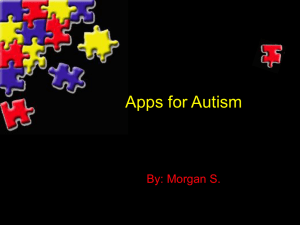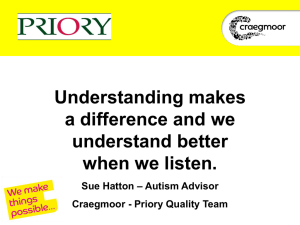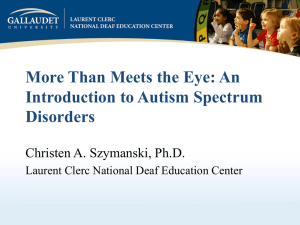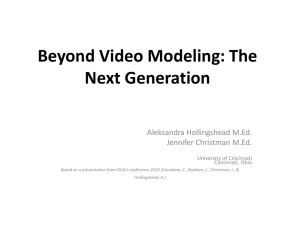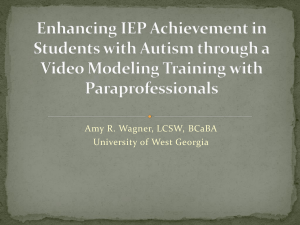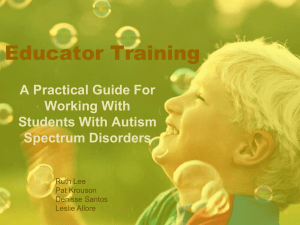A Qualitative Needs Assessment of Somali Families With
advertisement
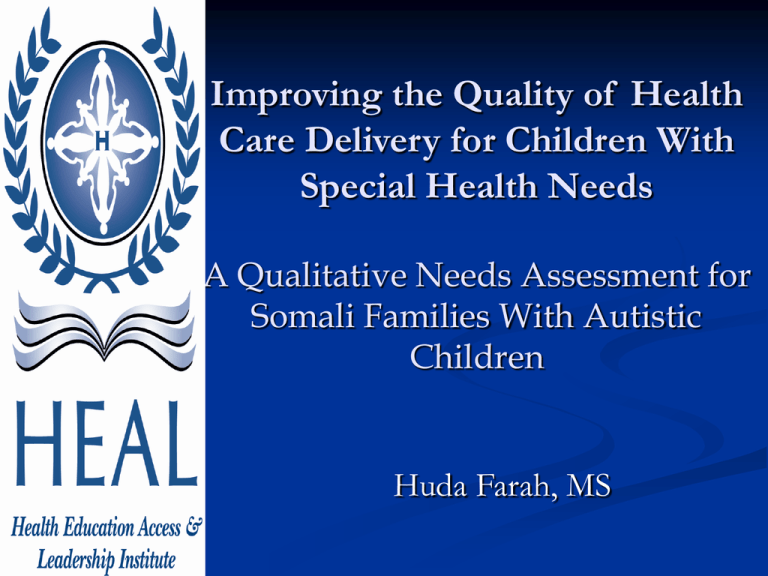
Improving the Quality of Health Care Delivery for Children With Special Health Needs A Qualitative Needs Assessment for Somali Families With Autistic Children Huda Farah, MS A needs assessment of Somali families of Children with autism was conducted by Deka Ahmed and Huda Farah in 2009 in Minneapolis Minnesota, under the umbrella of HEAL Institute. Conducted among parents of children with autism and daycare professionals who serve the Somali community. Background Somalis in Minnesota from 1993 - 2010 Demographics Socioeconomic and Education status Refugee Experience History of Autism in The Somalis Community of Minnesota 2006 noticed increase number of Somali children with developmental delays 2007 “HIIL NAAFO” for CICC 2008 Presentation for Refugee task force, WCCO report, Somali ASD initiative, Community Forum 2009 MDH report, and issues with data collection http://www.health.state.mn.us/ommh/projects/autism/report09 0331.pdf Professionals Forum & needs assessment research, other research attempts (vitamin D ) Why This Study? According to CDC autism is an urgent public health concern For Somalis this is a new disease, for the first generation, most of the children are on the severe end of the spectrum, and most families have multiple children with ASD Families are facing multiple barriers (systems, cultural, language, immigration, housing) There is little known about this population Objectives 1. To shed light on unmet needs of Somali families living with Autism, 2. To highlight the concerns of parents and caregivers of Somali children with Autism, and 3. To identify the potential barriers to accessing services. Methods Study Design: Focus Groups: One child care professionals N=6 One mixed parent group N=4 Personal Interviews Only parents were interviewed N=5 Methods Inclusion Criteria: Somali parents of a child with Autism (must have physical custody) Daycare professionals caring for Somali children. (Must spend a minimum of 12 hours per week with children) Must reside in the metro area. Needs Assessment Interviews and focus group questions covered the following themes: Definition of Autism Beliefs regarding the causes of Autism Community attitude towards special education Sources of information Unmet needs of families Findings and Data Analysis Analysis: Five themes were generated: 1. 2. 3. 4. 5. Beliefs about Autism and Mental Health Services Family and Community Impact Mental Health Needs of Parents Recommendations and training Request Beliefs Regarding the Causes of Autism Autism was described by participants as follows: ‘it is An American disease. We never saw it in Somalia; believe me when I say, and if children like ours were in the neighborhood, we would have known. You cannot hide Autism, especially if there were so many like here in Minnesota.’ (Father, 4 year old son) I learned that vaccines have mercury, and that affects the brain causing Autism. My child was a normal child until he received the vaccinations. 2-3 months after that he was no longer the same. (Father, 8 year old son) Beliefs Regarding the Causes of Autism There is a stigma surrounding mental illness as well as lack of knowledge regarding early intervention systems and special education ‘The Somali community does not know what special education is. They think it is for crazy people or mentally challenged persons. Basically it is shameful to use special education. If you take your child it is admitting your child is not normal.’ (Mother, 4 year old Son) Services Limited Access to Medical Diagnosis and Services, Lack of resources that provide information or services to assist with paperwork, Lack of accurate information about autism in the Somali community, Limited availability of trained Somali PCAs and cultural barriers in using non-Somali PCAs, designated service hours not enough to meet family needs. Services Waiver program in not available for families Lack of adequate daycare services was reported as a primary source of stress for all families Child care professionals expressed a fear that they will lose business, if found serving special needs children Lack of appropriate housing was also reported Quotes “ “Daycare is a big problem. It is hard because no one wants to care for children with special needs, and if they do accept these children, the providers do not have the appropriate training.” Mother, 6 year old son) - “We need daycare facilities. I have no help and I am human; I cannot take my child with me all the time to work or grocery. No daycare will care for my child.” (Mother, 4 year old son) - “If I have one child with Autism or special needs, the other parents will not bring their children because they fear an Autistic child might harm their infant or younger child.” (Daycare provider, 11 years of experience) The Process Don’t qualify Identification Referral Screening Eligibility Individual Plan Evaluation Follow-Along Services Quotes I was left stranded and standing alone. I waited 4 months for the specialist appointment. They sent me too much paper work that took me weeks and weeks to complete myself. Others had to help me with the paper work. Before the paper work, I waited and struggled to get a diagnosis. The long waiting period to see the specialist was unbearable. I had no directives from my doctor or school to care for my child. It was frustrating,...[Pause]….. when I finally saw the specialist, he only spent 15 minutes with me and told me the same things I already knew. I was upset with the ‘waste of time.’ I felt alone and confused and thought the system to have shut me down. How was I supposed to fight Autism, I was busy fighting the system’s many obstacles. It is heart breaking for us parents. There are many health care professionals with many differing opinions about one disease. (Mother, 4 year old son) Services: Housing “I was evicted from two apartments because my child was noisy. This made me very upset because my son was not doing it on purpose. Now, I find it hard to find a place to rent. The social worker and doctors are helping me now and we will be okay.” (Mother, 6 year old son) “They knocked on my door, called the police, and gave me warnings because my child [is] very active at night time.” (Mother, 4 years old) Family and Community Impact Trust in healthcare providers is undermined in this process Families are struggling financially Families isolate themselves in order to avoid stigma Increased concern over the limited attention paid to non-ASD siblings Fear of losing children to the government was common Cont’d … Cited lack of support from extended family Refugee experience In spite of these difficulties, parents are resilient and have cited spirituality as a source of comfort Mental Health Needs of Parents Parents described their lives as being stressful Parents reported isolation, anxiety and fear due to Autism Many parents have PSTD, due to the refugee experience Daycare professionals reported parents are difficult to deal with because they are overwhelmed Mental Health Needs of Parents - “You are isolated and you need emotional support. The Doctors need to be aware of how confused and scared you are. It is hard to even understand how this disease is all working.” (Mother, 4 year old son) - “My boys are getting too big for me to physically handle [them]; I do not remember the last time my husband and I got 10 minutes of continuous sleep. If one is sleeping through the night the other is awake and needs constant monitoring due to their violence. I can only say it is similar to having a new born at home for more than a decade.” (Mother, 16, 14 year old) Sources of Information Parental sources of information: Media- news in particular Family and friends Community Health care providers Schools Recommendations from Participants More communication from healthcare providers in a simpler and easy to understand format Assistance in navigating the system of care (roadmap) More funding for special education programs and early intervention (ABA) Appropriate training on special needs for daycare and providers and parents Mandatory licensing and training for all daycare providers and PCAs Summary of Inequities Accessing health care Accessing county services, Limited access to evidence based interventions that is data oriented (due to severity of ASD), Lack of knowledge of very complex systems of care with multiple players. Lack of knowledge of developmental milestones and red flags of a new disorder. Recommendations: Take Home Points When Creating Programs & Systems Consider: Accessibility Availability Affordability Acceptability Awareness Accountability Recommendations: Take Home Points When Concerns Arise Consider: Observe, Listen and Dig Deeper Share Concerns with Families in Culturally Competent Ways Remember Your Role and Know Your Bias Remember System’s Limitations Recommendations: Take Home Points Construct a coordinated system of care to minimize confusion, optimize equitable access, promote efficiency and permit sharing of information among providers Invest in competent professionals and use trained interpreters that are knowledgeable about child development and diagnostic tools (confidentiality is a big issue) Develop strategies for partnerships, support systems and culturally appropriate communications and education for parents and community members about ASD and other developmental disorders (roadmap) Recommendations: Take Home Points Next Steps More Research and collaborations Funding is Critical Take Action Thank You Huda Farah hudafarah@healinstitute.org



